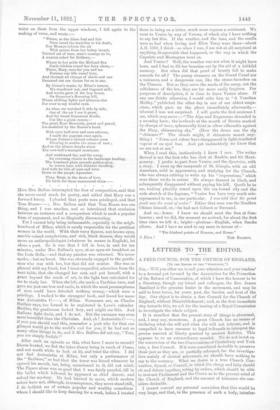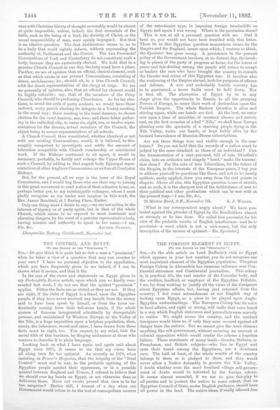LETTERS 71 , 0 THE EDITOR.
A FREE COUNCIL FOR THE CHURCH OF ENGLAND.
[TO TEE EDITOR Or TEE " SPECTATOR:1
SIIL,—Will you allow me to call your attention and your readers' to a demand put forward by the Association for the Promotion of the Reform of Convocation, of which I have the honour to be a Secretary, though my friend and colleague, the Rev. James Baudinel is the genuine leader in the movement, and may be said to have borne, for years past, the burden and heat of the day. Our object is to obtain a free Council for the Church of England, without Disestablishment; and, as the first immediate step towards this, we ask for the issuing of a Royal Commission to investigate the whole subject. It is manifest that the present state of things is abnormal, and, I may say, monstrous. A great Church has no moans of declaring what she will and what she will not tolerate, and is compelled to have recourse to legal tribunals to interpret the precise amount of liberty granted by ancient Rubrics. This appears to us an extraordinary scandal. We do not insist on the conversion of the two Convocations of Canterbury and York into a free Council. If it were considered desirable to preserve these just as they are, or partially reformed, for tho investiga- tion mainly of clerical grievances, we should- have nothing to say to the contrary. What wo desire is a true Church Con- vention, Synod, or Council, in which the clergy and laity should sit and debate together, voting by orders, which should be able to instruct Parliament and the Crown as to the present mind of the Church of England, and the amount of tolerance she con- siders desirable.
I cannot conceal my personal conviction that this would be very large, and that, in the presence of such a body, interrer.
ence with Christian liberty of thought or worship would be almost or quite impossible, unless, indeed, the first essentials of the faith, such as the being of a God, the divinity of Christ, or the moral responsibility of man, were openly impugned. Brit that is an ulterior question. The first desideratum seems to us to be a body that could rightly inform, without superseding the authority of, Parliament and the Crown. The two Provincial Convocations of York and Canterbury do not constitute such a body, because they are exclusively clerical. We hold that in a genuine Church Council in our day, the laity must have a place. Further, we are of opinion that an official, clerical element, such as that which exists in our present Convocations, consisting of deans, archdeacons, d5c., should sit, in a true Church Council, with the direct representatives of the clergy at large. So are we generally of opinion, also, that an official lay element would be highly valuable ; say, that of the members of the Privy Council, who should be professing Churchmen. As for lay elec- tions, to avoid the evils of party contests, we would have these indirect, every parish electing its delegate in a Vestry meeting, in the usual way ; these meeting in the rural deanery, to choose electors for the rural deanery, say, two ; and these latter gather- ing in the cathedral city, to name six, eight, ten, or twelve repre- sentatives for the diocese, actual members of the Council, the object being to secure representatives of all sehools.
A Church Council thus constituted, whether identical or not with our existing Convocations, would, it is believed, be tho- roughly competent to investigate and settle the amount of toleration compatible with Church membership or ministerial work. If the Bishops continued to sit apart, it would be necessary, probably, to fortify and enlarge the Upper House of such a Council, by adding to that august body Episcopal repre- sentatives of other Anglican Communions, as well as all Coadjutor Bishops.
But, for the present, all we urge is the issue of the Royal Commission, and I would beg those who see their way to joining in this great movement to send notice of their adhesion to me, or, perhaps better yet, to my indefatigable colleague, whom I most gladly recognise as my leader and inspirer in this work, the Rev. James Banclinel, at 1 Baring Place, Exeter.
Only one thing more I desire to say,—we are not acting in the interest of bigotry or of party spirit, but in that of the whole Church, which seems to us exposed to most imminent and alarming dangers, by the want of a genuine representative body, laving mission and authority to speak in her name.—I am, Llangunider Rectory, Crickhowell, November 3rd.







































 Previous page
Previous page